Many adults are getting diagnosed with autism. Something is making them seek an assessment.
Eight autistic adults tell what made them seek an evaluation.
*****
A person who’s felt “normal” all their life doesn’t just wake up one day and think, “Hmmm, I wonder if I might be on the Autism Spectrum.”
A person could feel out-of-place or not belonging to this world since childhood and still, well into adulthood, never consider that they just might possibly be autistic.
They might first consider they have a personality disorder (as I had done), or just be a “natural introvert.”
But at some point, self-diagnoses of anxiety, introversion, neurosis, OCD, ADHD, etc., lose their steam.
They may start realizing, Damn, I’m autistic AF.
Below are the accounts of eight clinically diagnosed autistic adults, myself included.
10 Reasons an Adult Might Suspect They’re Autistic
All their life, they’ve felt disconnected and unable to fit in.
They often learn to blend with others through practice, but no matter how skilled they get at this (masking), it feels unnatural or forced.
There’ve been other issues, too, that were never considered to be autism, such as sensory related.
For example, I have an intense aversion to the feel of stickers on merchandise including fruit.
I’ll avoid letting my fingertips come in contact with any kind of label: price, where it was made, manufacturer information and any other miscellaneous information for the product.
I’ll spend large amounts of time scraping off stubborn stickers with an X-acto knife.
- I can’t look at tumbleweeds under a car
- If the edge of an open door is facing me such that I can’t see either side — I’ll have to get up and move the door so I can see one of its sides.
- I can’t stand the sight of long loose carrots every which-way in a bag, as shown below.

Can’t look. They must be parallel to each other.
But in the past, these issues never made me think, “Hmmm, could I be autistic?” Instead, I thought these issues were just me being me.
#1 Reading Content Authored by Autistic People
Then I came upon a lot of content by autistic authors. That did it.
I was stunned at how closely their experiences – both externally and internally – mirrored mine!
Other people, who’ve felt weird and out-of-place all their life, may eventually happen upon content authored by Autistics.
Suddenly, the wayward dots will connect. They’ll see themselves in the narrative. They’ll go, “That’s me! I could’ve written this!”
Ashley Gartner, 24, was diagnosed with ASD at 24.
She explains, “I discovered I was autistic before getting diagnosed.
“I follow a woman on Instagram who announced she was autistic back in the spring of 2022.
“She then started spreading education and awareness about autism, especially how autism presents in females.
“The more she would post, the more I thought I might be autistic. So that’s when I sought out a diagnosis.
“If it had not been for that person I follow on Instagram, I don’t think I would have discovered I was autistic.”
#2 Partner Points It Out
“It began with my partner making jokes about me being autistic,” says Jess Owen, who is the co-creator of thewyrdsisters.co.uk and diagnosed with ASD at 25.
“I’d make an inappropriate comment, or group my pens by color, or give a 10 minute monologue on Lord of the Rings that no one had asked for, and he’d cough and go ‘autism’ under his breath.
“At first, it was just funny. Then, it was funny and interesting.”
#3 Family Member Points It Out
I would’ve began suspecting I was autistic 20 years ago had my sister, who had been already suspecting it, opened up to me about it. But she kept silent.
A poster on wrongplanet.net wrote that she had a “sensory meltdown in a brightly lit shop” and “ranted” to her daughter about it.
The poster then quoted her daughter’s response: “You know you’re autistic, right?”
The daughter had always assumed her mother knew of the autism, but that was not the case. Eventually Mom got the diagnosis.
#4 Seeing a Film or Video
More and more characters in film are being presented as autistic, and undiagnosed autistic viewers have identified with them.
“I most identify with fictional characters like Spock or Data in ‘Star Trek,’” says Justin Donne, a businessman diagnosed with autism at 34.
“I never understood social norms, customs and other conventions like small talk, etc.; like, what’s the point.”
Even if the character in a TV sitcom or drama isn’t actually identified as being on the Spectrum, a viewer who strongly relates to that character (such as Seven-of-Nine from “Star Trek: Voyager,” Sheldon from “Big Bang Theory” and Temperance Brennan from “Bones”) will invariably research the character and discover that he or she has been “coded” for autism. Hmmm…a lightbulb moment.
A post on wrongplanet.net by an Autistic said she never suspected the condition until she just happened to be watching a BBC documentary about autistic teens at school.
She realized that her own teenage years had been very similar.
Another poster said that in high school he saw a reality TV episode that featured an autistic girl in the classroom. The post says, “I thought, ‘Oh look, someone like me.’”
#5 Unique Circumstance Raises Suspicion
“In February of 2020, I was in a severe car accident and suffered a traumatic brain injury,” says Brad Biren, a tax and elder law attorney with a specialty in crisis Medicaid planning, diagnosed with autism at 35.
“Oftentimes, such an injury is said ‘to add butane to existing embers.’
“In my case, I had the embers of autism but never diagnosed; yet the process of healing after the accident amplified my symptoms of autism.
“I learned of my diagnosis when a very well-meaning healthcare provider asked me how I thought the traumatic brain injury had affected my autism.
“At that point I had yet to be diagnosed. I asked for clarification, and when it became clear that I did not know I was exhibiting strong symptoms of autism, the care provider explained the diagnosis using the DSM-5.
“After much reflection and discussion it became clear that I was already exhibiting many of the signs of autism prior to my car accident: the love of minutia, pattern-seeking, anxiety.”
Jess tells of a very enlightening experience that sealed the deal:
“After graduating I got a job as a learning support assistant in my local college.
“I worked mainly with students who had autism and ADHD, and I began to think … what was so different about them?
“How they learned, how they talked, every dimension of their behavior seemed so normal to me.
“I was more at ease with them than I was with the staff. Then lockdown hit, and we were given a tidal wave of training courses on neurodiversity to pass the time, and… ah. There it is. I ticked almost every box I read.”
#6 Child Gets Diagnosed with ASD
A parent will realize just how much they’re like their kid with the diagnosis, and then start suspecting that they, too, are autistic.
“I have my amazing 16-year-old to thank for that!” says Clarissa Harwell, LCSW, a therapist diagnosed with autism at 43.
“Around age 12, they began learning more and more about autism and suspected they might be autistic.
“My initial thought was, ‘No way! I would know. I’m their mother and I definitely would have realized if they were autistic.’” However, Clarissa’s teen received a clinical diagnosis.
Clarissa explains that the similarities between her and her child “got me thinking. For quite awhile I had thoughts like, ‘Well, I can’t be autistic because of this, that and the other thing….I had so many reasons that I couldn’t be autistic.” Ultimately, the similarities couldn’t be ignored.
Lena Salgado, a black belt who co-owns a karate school, got her autism diagnosis at 37.
“My son had been diagnosed about three years earlier, and the more I filled out his assessments and testing information, the more I began to notice my own differences,” says Lena.
“I was always the weird kid and was a super picky eater; smells would overwhelm me; too many people and too much noise would also be super overwhelming.
“I just learned to structure my life in a way to avoid those things.
“When I went into the military as a Korean linguist, I worked in places that were quiet and fairly isolated, so I didn’t have too much trouble then.
“After I left the military, I became a stay at home mom so I could go to stores when they weren’t busy and maintain a routine that worked for me and my kids.
“Then, when I was pursuing a diagnosis for my son when he was a toddler I started paying more attention to my own behaviors and avoidances based on the questions I would have to answer for him.”
A parent getting the autism diagnosis following their child’s is a rather common phenomenon.
#7 History of Troubles at Various Workplaces
After years of having issues on the job, one may finally decide to undergo a psychological evaluation, but often, not before they first do a little research and conclude that autism best explains their negative experiences.
The problems at workplaces are broad and include not getting along or fitting in with coworkers, internal distress or resistance to change or transitions, being thought of as weird, having sensory issues and being blunt.
#8 Exhaustion from Job Related Social Events
This has been going on for years, and finally, the individual has HAD it and decides to research what could be going on, knowing that this is not normal.
Some autistic individuals have jobs that require after-hours socializing or on-the-job heavy engagement in office politics.
Some are in customer service or have positions involving extensive interactions in which the right facial expressions, vocal intonations, knowing when to smile and chuckle and lots of handshaking are crucial.
The strain and drain on keeping up “the act” — either as part of the job or for a job related social event — become too much, leading to burnout or a realization that something is clearly wrong.
#9 Being Asked, “Are you autistic?”
I’ve read of several accounts of people, eventually diagnosed with ASD, who’d get asked this question from time to time.
One might first think it’s a joke, but after getting asked a few more times – even over a very lengthy time lapse – they begin realizing that several people can’t all be wrong…can they?
This reflection brings on a closer look at one’s behaviors throughout life, how people responded to them in ways they didn’t understand, how things were difficult for them that came easier for others, how they seemed to be the only one adversely affected by something that didn’t phase other people, etc.
#10 Hearing All Their Life How They Lack Empathy
They’ve been called aloof, cold or too indifferent.
A person not yet diagnosed with ASD may hear other descriptors such as hardly talks at social gatherings, distances himself too much, has no feelings, doesn’t have empathy.
“Am I really cold and uncaring?” they may finally ask themselves. “Why do people see me that way?”
An investigation ensues, and Autism Spectrum Disorder fits the bill when they discover that the other traits of this neurotype fit them so well.
As for lack of empathy, this is more about what a neurotypical person perceives in an autistic person than what an autistic person actually feels.
Additional Things that Can Make an Adult Think They May Be on the Autism Spectrum

©Lorra Garrick
Ashley explains, “I could not maintain friendships. Every single friend I ever made I either lost or cut off.
“I would have shutdowns and meltdowns that were becoming more frequent because life was getting harder and harder.”
Jennifer Parr was diagnosed as autistic at age 30. “I have always struggled with social situations and had trouble making friends,” says Jennifer, a multimedia artist.
“It just never seemed to come naturally to me, and I felt like something must be wrong with me because everyone else around me seemed to be able to navigate social interactions easily for the most part.”
Jennifer also has always had challenges with sensory issues.
She explains, “I noticed I had sensory differences growing up, but it wasn’t until adulthood where it started getting bad due to being in an environment that was extremely unfriendly to my sensory needs that I realized that something was different.
“I started looking into sensory processing disorder and from there discovered autism.”
Source: wrongplanet.net/forums/viewtopic.php?t=409010
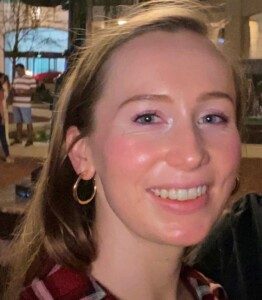 Ashley Gartner runs Ash Esthetics, a holistic skincare site where she shares her expertise in skincare, a passion she’s had since age 12. “I was determined to learn everything there is to know about skin,” says Ashley, who’s licensed as a master esthetician. “My main goal is to just help people because I know how hard it is to have healthy skin.”
Ashley Gartner runs Ash Esthetics, a holistic skincare site where she shares her expertise in skincare, a passion she’s had since age 12. “I was determined to learn everything there is to know about skin,” says Ashley, who’s licensed as a master esthetician. “My main goal is to just help people because I know how hard it is to have healthy skin.”
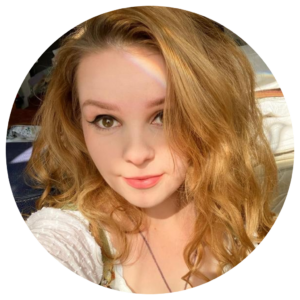 Jess Owen, along with her sisters Emily and Abi, run thewyrdsisters.co.uk, about autistic sisters navigating a neurotypical world. Their goal is to spread information and awareness, and open up a conversation about neurodiversity that will make life easier for everyone.
Jess Owen, along with her sisters Emily and Abi, run thewyrdsisters.co.uk, about autistic sisters navigating a neurotypical world. Their goal is to spread information and awareness, and open up a conversation about neurodiversity that will make life easier for everyone.
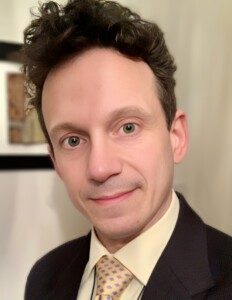 Justin Donne is an accomplished leader with experience across private and nonprofit sectors, including roles at Disney Parks & Resorts and Autistic Nottingham. He excels in team leadership, budget management and driving growth. Justin is an advocate for positive change and has a strong belief in the power of community, and is a passionate advocate for diversity, equity and inclusion.
Justin Donne is an accomplished leader with experience across private and nonprofit sectors, including roles at Disney Parks & Resorts and Autistic Nottingham. He excels in team leadership, budget management and driving growth. Justin is an advocate for positive change and has a strong belief in the power of community, and is a passionate advocate for diversity, equity and inclusion.
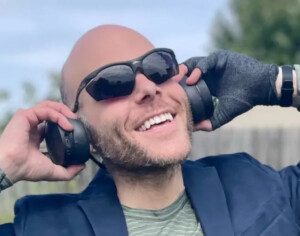 Brad Biren, Esq, LL.M, specializes in assisting individuals with special needs and diverse talents who are overcoming sudden adversity. He utilizes his inspiring tale of overcoming unexpected adversity to help motivate others in the community to pursue their goals.
Brad Biren, Esq, LL.M, specializes in assisting individuals with special needs and diverse talents who are overcoming sudden adversity. He utilizes his inspiring tale of overcoming unexpected adversity to help motivate others in the community to pursue their goals.
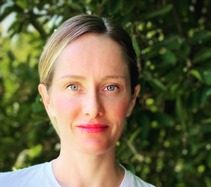 Clarissa Harwell, LCSW, has worked with a diverse range of clients for 15+ years including families experiencing homelessness, children who’ve experienced abuse and neglect, new parents, adults impacted by severe mental illness, and children and teens engaging in high-risk behaviors.
Clarissa Harwell, LCSW, has worked with a diverse range of clients for 15+ years including families experiencing homelessness, children who’ve experienced abuse and neglect, new parents, adults impacted by severe mental illness, and children and teens engaging in high-risk behaviors.
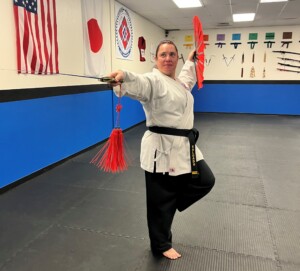 Lena Salgado co-owns Martial Science Academy, teaching students of all ages and abilities the physical, emotional and mental benefits of Shito-Ryu Karate. At MSA, they strive to create a safe and nonjudgmental environment. MSA uses different approaches depending on each student’s learning style to make Karate accessible to all. Follow on Facebook.
Lena Salgado co-owns Martial Science Academy, teaching students of all ages and abilities the physical, emotional and mental benefits of Shito-Ryu Karate. At MSA, they strive to create a safe and nonjudgmental environment. MSA uses different approaches depending on each student’s learning style to make Karate accessible to all. Follow on Facebook.
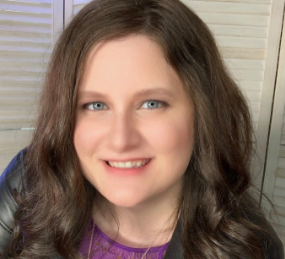 Jennifer Parr has always had a devoted obsession to art and creativity. Her ultimate goal is to help others discover their own creative side and find enjoyment through art and crafting.
Jennifer Parr has always had a devoted obsession to art and creativity. Her ultimate goal is to help others discover their own creative side and find enjoyment through art and crafting.
 Lorra Garrick has been covering medical and fitness topics for many years, having written thousands of articles for print magazines and websites, including as a ghostwriter. She’s also a former ACE-certified personal trainer. In 2022 she received a diagnosis of Level 1 Autism Spectrum Disorder.
Lorra Garrick has been covering medical and fitness topics for many years, having written thousands of articles for print magazines and websites, including as a ghostwriter. She’s also a former ACE-certified personal trainer. In 2022 she received a diagnosis of Level 1 Autism Spectrum Disorder.
.














